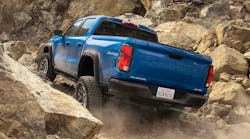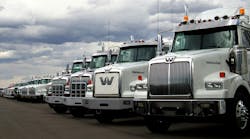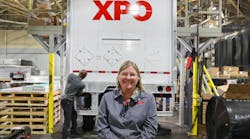Trailers of all shapes and sizes – from dry van and refrigerated models to flatbeds – are undergoing a bevy of changes these days, driven by fleets that are demanding lighter, more durable, yet less costly equipment they can use over much longer ownership cycles than in the past.
Interviews with several major trailer makers also indicated that demand for trailers is increasing, reflecting a growing shortage of equipment available on the used market.
“Big customers are looking for weight savings first and foremost,” noted Hank Prochazka, vice president-sales and marketing for Fontaine Trailers. “Their power equipment has steadily gotten heavier with APUs [auxiliary power units] and new emissions standards while their customers – the shippers – are trying to reduce costs by shipping more tonnage with every load. [The fleet] mindset remains in the commodity purchasing mode (i.e. low price) until they examine what new technology can do for them.”
Prochazka added that fleets today do not have to give up durability to run with lighter trailer equipment, but the up-front purchase cost is higher. That being said, he stresses that some fleets are gaining business with shippers by running lighter trailers that let them offer heavier payloads.
“Designs will continue to evolve toward lighter tare weights, corrosion resistance, easier and less expensive maintenance requirements,” said Stuart James, vice president-sales for Hyundai Translead. “Certainly fuel economy is always on fleet operators’ minds, [as] fuel is a massive cost element for them that they never ignore. Low-rolling resistance tires seem to be an effective response at virtually no added cost.”
Durability of the trailer as a whole is another big factor customers are stressing more and more these days, he added – relating both to “toughness” and longevity.
“What we are seeing is a requirement that the trailer must be in good condition when it reaches that point that they flush it from the fleet, and in terms of battling corrosion, that is not as easy as it sounds,” James pointed out.
“Trailer design evolution is actively ongoing but this evolution is largely in small step increments with relatively few major, single-design change introductions,” stressed David Pickup, Wabash National’s manager of product engineering development.
“There is, however, an active demand for both unit weight reduction and increased floor loading capacity,” he explained. “These requirements are, and will continue to be, a driver [for] the use of newer, higher strength materials, together with associated changes in design to ensure their optimal use. We’ll also see increasing demand – driven by both legislative and environmental reasons – for the greater incorporation of aerodynamic devices into the trailer structure rather than as ‘after the fact’ add-ons.”
Demand for used trailers – both dry van and refrigerated units – has also definitely picked up over the past six months, especially for later model equipment, said Kevin Nomina, Wabash’s used fleet manager.
“We are also starting to see pricing rebound as well for the first time in nearly two years,” he noted. “Supply is an issue. Customers seem to be keeping their equipment longer as trailers are being built of more durable material and lasting longer. Customers are not replacing their equipment as quickly as they once did.”
“Good late-model used equipment is starting to bring a premium, telling us that the used market is beginning to dry up,” added Fontaine’s Prochazka. “Refurbishing trailers is a hot topic, but it only makes sense if the equipment is not past the point of economic feasibility. Owners just need to weigh the costs of updates and the true operating costs against the estimated return and make their best decision.”
Looking into the future, customers are going to continue examining their business environment first – what shippers will demand, changes in regulations, fuel and other operating costs and competitive environment – and then establishing their true cost of ownership over that expected life span of the equipment, he said
“Customers are typically willing to pay more up front for better equipment if they can see savings down the road,” noted Prochazka.




